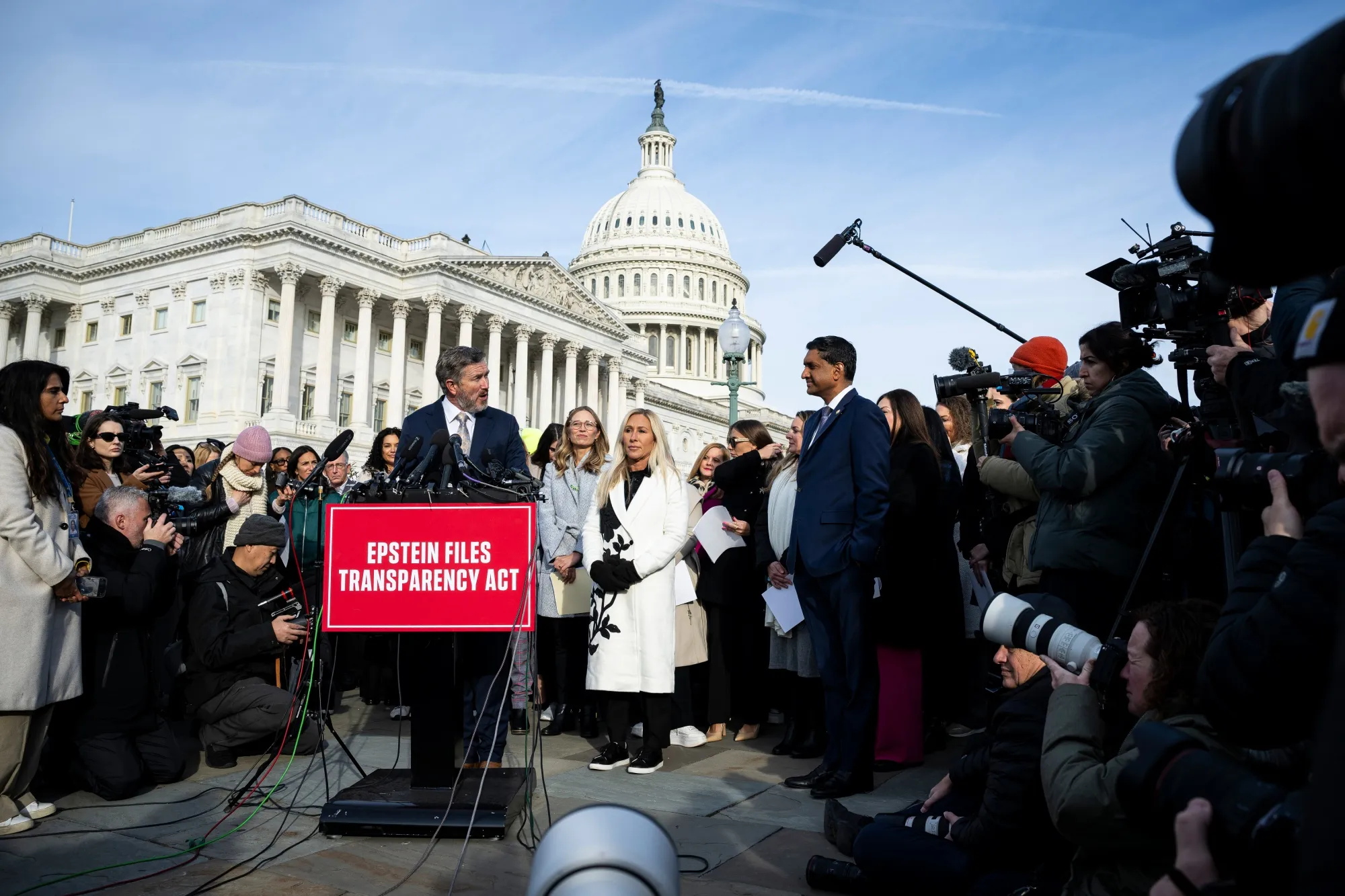Senate Approves Epstein Files Bill: A Landmark Transparency Win—and a Political Blow to Trump

A Rare Moment of Unity in Washington
In one of the most striking bipartisan moments in recent congressional history, the U.S. Senate has agreed to pass a bill requiring the public release of government files related to Jeffrey Epstein. This follows an overwhelming 427–1 vote in the House of Representatives, signaling near-universal political consensus on an issue that has haunted American public life for over a decade.
The bill now heads to President Donald Trump’s desk. Its timing is politically sensitive: the GOP has suffered notable election defeats earlier this month, and the Epstein files vote adds yet another challenge to Republican momentum.
While the legislation marks a victory for survivors, transparency advocates, and public accountability, it also represents a growing political setback for Trump, who long resisted such disclosures.
What the Epstein Files Bill Actually Requires
The bill mandates the release of a sweeping collection of documents related to Epstein’s crimes, investigations, associates, and any government handling of the case.
Key components include:
- Mandatory public release of all unclassified investigative files held by federal agencies, including communications, memos, reports, and case records.
- A searchable, downloadable database to be created for public access.
- Strict limits on redactions, which must be justified only for ongoing legal or security concerns—not for political embarrassment or reputational protection.
- A timeline for release, compelling the Department of Justice to act swiftly once the bill becomes law.
- Provisions to protect victims, allowing removal of identifying information for survivors who request confidentiality.
In essence, the bill strips away the government’s ability to keep key documents sealed unless there is a legitimate legal reason to do so.
Why Congress Moved So Quickly and Overwhelmingly
The near-unanimous support across party lines is unusual, especially in an era of deep polarization. Several major motivations appear to be driving the urgency:
1. Demand for Public Transparency
Americans across the political spectrum have long mistrusted how the Epstein case was handled, with suspicions surrounding his death, his connections to powerful individuals, and the secrecy of documents. Congress is now responding to years of pressure.
2. Justice for Victims
Survivors and advocates have repeatedly emphasized that truth and transparency are essential for closure—especially in a case involving decades of systemic abuse and failures by institutions.
3. A Rejection of Government Secrecy
Lawmakers from both parties signaled a shared belief that the state should not hide information simply because it may be politically damaging.
4. Political Self-Protection
By voting overwhelmingly for transparency, both parties insulate themselves from accusations of complicity or cover-ups.
Why This Is a Political Setback for Trump
President Trump had previously opposed efforts to release Epstein files. But with overwhelming support from both the House and Senate, he now faces intense pressure to sign the bill quickly—or risk appearing to obstruct transparency.
Several factors make this especially damaging:
1. The vote highlights Trump’s isolation
Even Republicans who have aligned with him on major issues broke ranks to support the bill. The message: some issues transcend political loyalty.
2. The GOP is already weakened
Following recent election losses across several states, this episode adds to the narrative that Trump’s influence is slipping.
3. Trump’s past comments on Epstein resurface
His earlier downplaying of the matter is now contrasted with overwhelming congressional demand for full disclosure.
4. Any delay or resistance will intensify public suspicion
If Trump hesitates, critics will argue he has something to hide—even if there is no direct connection.
5. The release may contain politically uncomfortable information
While the bill does not target Trump specifically, any revelations involving high-profile individuals close to either political party could reshape the political conversation heading into campaign season.
What Happens Next: The Road to Public Disclosure
Once Trump signs the bill—or if he does nothing and allows it to become law—the timeline begins:
1. DOJ publishes the files
Agencies including the FBI, DOJ, and others must begin releasing their Epstein-related documents, subject only to limited redactions.
2. New investigations may emerge
Depending on what is revealed:
- civil lawsuits
- congressional inquiries
- independent investigations
could be launched.
3. Potential political fallout
Names, connections, and institutional failures documented in the files may generate new controversy across political, legal, corporate, and social spheres.
4. Increased public scrutiny of past failures
How Epstein was able to operate for so long—and who enabled him—will again come under intense focus.
Risks and Challenges Going Forward
While transparency is broadly supported, releasing sensitive material is not without risks:
- Victim privacy must be protected, requiring careful redaction procedures.
- Ongoing criminal or civil cases could be affected by disclosure.
- National security concerns may arise if intelligence-related material is included.
- Public interpretation of complex documents could lead to misinformation or mischaracterization.
- Political weaponization of the files is almost inevitable, especially in an election cycle.
Congress, the DOJ, and oversight bodies will have to balance clarity with care.
What This Moment Means for U.S. Governance
The passage of the Epstein files bill may become a defining moment for congressional transparency. It suggests the emergence of a new standard:
- The public has the right to know,
- powerful individuals cannot expect protection,
- and government agencies cannot indefinitely hide politically sensitive material.
It also signals a shift in political calculation: protecting institutions now requires exposing their past failures—not concealing them.
Conclusion: A Turning Point for Transparency—and for Trump
The Senate’s approval of the Epstein files bill represents more than legislative action. It embodies a national demand for answers.
For victims, it promises long-delayed recognition.
For the public, it offers hope of clarity in one of the most disturbing scandals of the modern era.
For Congress, it demonstrates rare unity.
For Trump, it is a political test—one unfolding at a moment of vulnerability for him and his party.
What comes next will depend on what the files contain and how swiftly they are released. But one thing is clear:
This is not just a bill. It is the start of a reckoning.

















